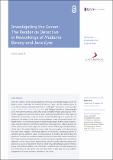Investigating the canon : the reader as detective in re-workings of Madame Bovary and Jane Eyre
Abstract
Since the 1990s, a trend towards adapting, rewriting, or otherwise engaging with the literary canon – especially the nineteenth-century novel – via the popular genre of crime fiction may be observed on both sides of the English Channel. Taking as its main examples Jasper Fforde’s 2001 novel The Eyre Affair, and Philippe Doumenc’s Contre-enquête sur la mort d’Emma Bovary (2009), this article sets out to consider what is special about crime-fiction engagements with the literary canon, and how they differ from other types of adaptation, in particular the use of the central detective figure as a proxy for the position of the reader. Crime and its subgenres – in the selected examples the whodunit and hard-boiled thriller – may be seen as a transnational genre which readily adapts itself to local contexts. I argue that both Doumenc and Fforde adapt their chosen genres in order to explore the nature and purpose of their respective national canons. Following a detailed analysis of the role of the reader-detective in each text, the article goes on to demonstrate how both texts engage in the contemporary theoretical debate on canonicity, including questions of authorial genius, aesthetic value, and the pleasure of reading. By emphasising the position of the ordinary reader, familiar with the codes and conventions of both ‘high’ literature and genre fiction, crime fiction reworkings offer a non-hierarchical approach to the literary canon, refigured as part of a shared cultural property and, above all, a source of enjoyment.
Citation
Jones , K 2023 , ' Investigating the canon : the reader as detective in re-workings of Madame Bovary and Jane Eyre ' , Modern Languages Open , vol. 2023 , no. 1 , pp. 1-17 . https://doi.org/10.3828/mlo.v0i0.274
Publication
Modern Languages Open
Status
Peer reviewed
ISSN
2052-5397Type
Journal article
Collections
Items in the St Andrews Research Repository are protected by copyright, with all rights reserved, unless otherwise indicated.

